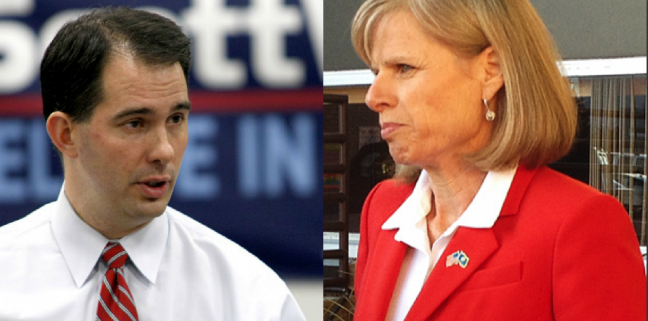The most recent Marquette Law School Poll indicated Gov. Scott Walker has gained a 45 to 50 percent lead among likely voters over challenger Mary Burke. However, upon examining the data, partisan and policy support as a whole for both Democrats and Republicans is divided shockingly equally. As congressional support and presidential approval continue to decline, it appears that public attitudes toward specific issues are polarized, which is the reason politicians get away with ridiculous political gestures (the government shutdown, increased filibustering) that bar governmental progress — they know half of the attentive public will support them. I think we should read through the Marquette Poll, and see how problematic party allegiances have become.
Conservatives in Wisconsin appear to have gathered a marginal lead among those who plan to vote. A narrow majority of likely voters support Walker and Republican attorney general candidate Brad Schimel. There is also a belief that the economy is headed in the right direction, but we cannot measure how much of this credit is to President Barack Obama, Walker or neither.
The Supreme Court delayed its implementation, but the Republican-backed voter ID law unsurprisingly still has substantial support among already likely voters — 62 percent of those surveyed viewed it favorably. Raising the minimum wage, a Democrat-backed position is noticeably favored in support as well, standing at 57 percent. In regard to health care, the voting public is unhappy with the Affordable Care Act’s implementation thus far, 49 percent to 40 percent. At the same time, 56 percent simply believes the law can be improved upon, not repealed. Additionally, 56 percent of those surveyed were unhappy with Walker’s decision to reject Medicaid expansion. What this tells us about the ACA in Wisconsin is that Democrats and Republicans can cite statistics that both support and protest the law; surely there can be some happy medium between the two sides.
Recent reports and news releases have hurt both campaigns in Wisconsin. Walker’s support fell after data showed Wisconsin lagging in job growth, while Burke’s dropped after news of her “plagiarized” job plan. These two issues also had nearly equal statistical impact on the candidates’ campaigns, Walker lost about 24 percent to Burke’s 19 percent.
What does this all mean for Walker and Burke in the gubernatorial election? With just weeks left, voter turnout is the deciding factor for victory. Walker’s support only leads 45 to 46 percent over Burke among registered voters. In most of the data (such as presidential and gubernatorial approval ratings), registered voters, a greater sample size of the general population, indicated an even more equal divide along partisan lines. With likely voters leaning slightly more right, the primary goal of the Burke campaign will be to encourage turnout.
Congressional approval, political efficacy and faith in government are at distressingly low percentages. Survey information indicates public opinion is incredibly polarized, which seemingly incentivizes politicians to avoid bipartisanship, limiting a government’s ability to act at all. Still, there is a path out of this complicated knot. If the public demands and promotes compromise and collaboration, politicians will have no choice but to cater to this ideal. The electoral system in the United States promotes a two-party system, which is not always a bad thing, but it has left everyone unhappy with government progress and at opposing parties.
Many believe that a vote not cast for the two major parties is “wasted.” Yet third party candidates were the deciding factors in the 1992 and 2000 presidential elections, and independent affiliation across the United States has grown substantially since then; more people consider themselves independent than swear support for a particular party. Now, this could be simply due to a decreased approval of government overall, but it still means a moderate voice can influence government, even decide elections. This is the task for frustrated voters; look to the middle to achieve progress and collaboration in the government.
Omer Arain ([email protected]) is a sophomore majoring in political science and economics.





















